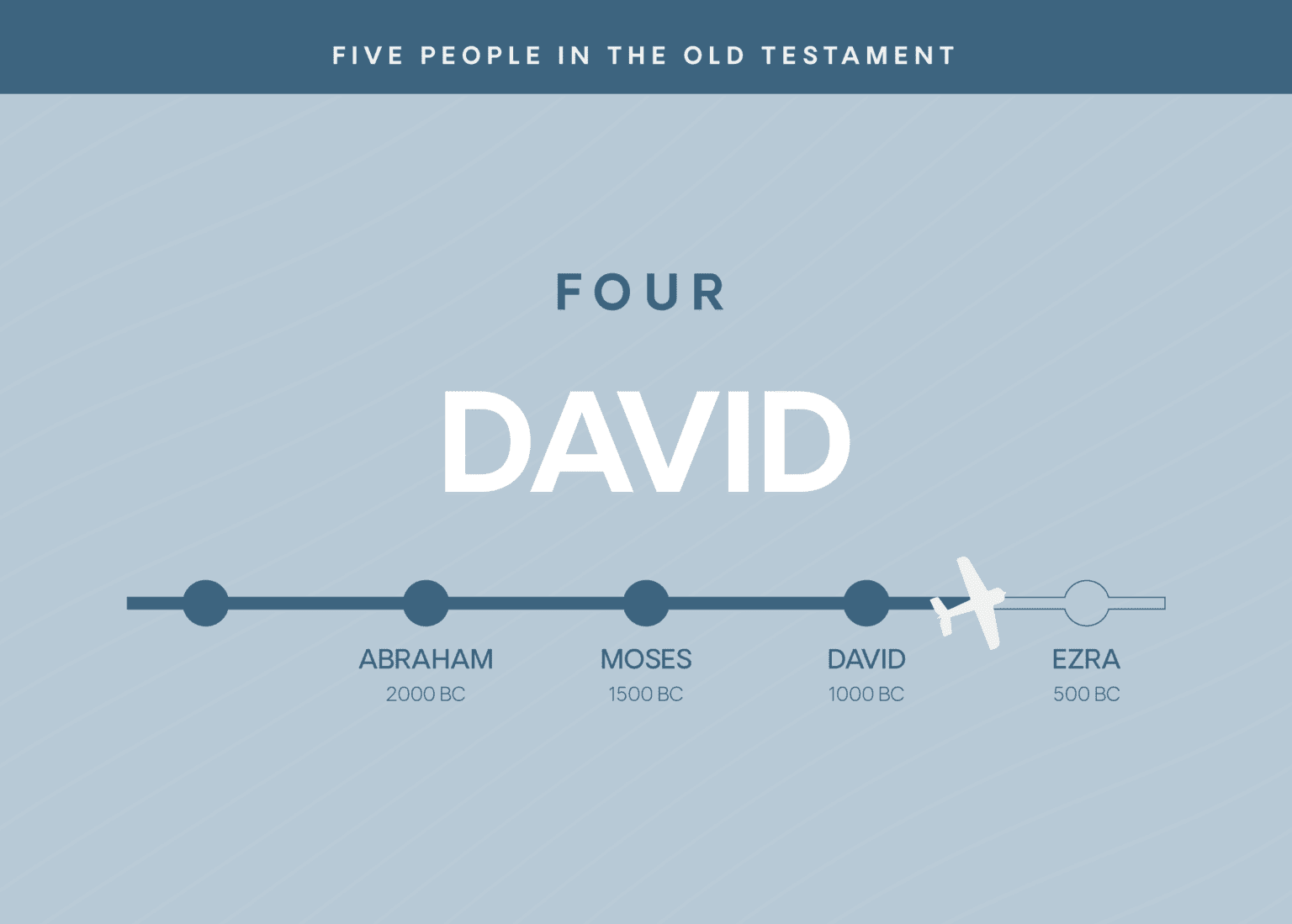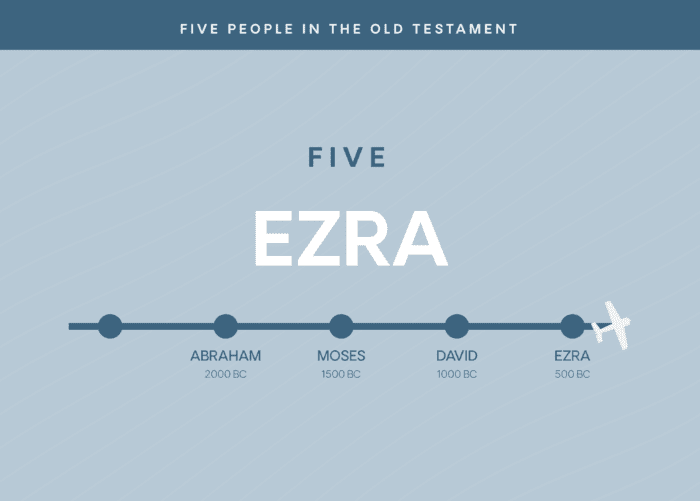
The Flight
4. David

Other nations had a settled form of leadership and God’s people wanted to have a king. The first king, whose name was Saul, was a big disappointment. He was arrogant, devious, and foolish, and over time, he became increasingly unstable. God had another king in mind who would reflect His own heart, and at the direction of the Lord, David was anointed by Samuel the prophet (1 Samuel 16:13). But years would pass before David came to the throne.
David got people’s attention when they heard the story of his great victory over Goliath. This giant of a man was nine feet tall, his armor weighed 125 pounds, and he carried a long javelin with an iron point.
Every morning Goliath came out to taunt the people of God.
“Choose a man for yourselves, and let him come down to me. If he is able to fight with me and kill me, then we will be your servants. But if I prevail against him and kill him, then you shall be our servants and serve us.” (1 Samuel 17:8–9)
The Israelites didn’t know what to do. They all felt that they would be losers against Goliath. So the taunts and the humiliation went on, until David arrived and offered to fight him.
David must have looked pitifully small as he faced up to the giant on the other side of the valley. But Goliath had defied God and God was with David.
David put his hand in his bag and took out a stone and slung it and struck the Philistine on his forehead. The stone sank into his forehead, and he fell on his face to the ground. (1 Samuel 17:49)
David’s victory gives us a window into the central Bible story. A thousand years after the time of David, Jesus, a descendent of King David, arrived on the field of battle and faced up to our greatest enemies. If Jesus had lost, there would have been no hope for us. But Jesus triumphed over our greatest enemies—sin, death, and hell—and all of His people will share in His victory.
David was without question the greatest of the Old Testament kings. Under his leadership, the twelve tribes of Israel were united as one people. Enemies who had oppressed the people of God were pushed back and God’s people prospered. With strong defense, a thriving economy, and stable leadership, God’s people had never had it so good.
We need a better king
David was a strong-willed and impulsive man who accomplished great things, but he also had some great failures. Sometimes we learn from him by example. Other times we learn from him by contrast.
David abused his power and committed adultery with a woman called Bathsheba. When she became pregnant David recalled her husband, Uriah, who was serving in the king’s army, and sent him home so that when the child was born, Uriah and everyone else would assume that this was his child. But Uriah was a man of honor. He refused to enjoy the comforts of home while the men with whom he served were risking their lives on the field of battle.
So David sent Uriah back to the battle with a sealed letter of instruction to his commander:
“Set Uriah in the forefront of the hardest fighting, and then draw back from him, that he may be struck down, and die.” (2 Samuel 11:15)
The news of Uriah’s death was reported to Bathsheba, and after a period of mourning, David sent for her, and she became his wife. The cover up was complete, except for one thing: God knew. “The thing that David had done displeased the Lord” (2 Samuel 11:27).
David had defied God’s commandments. He had coveted his neighbor’s wife, he had lied to Bathsheba and Uriah, he had stolen another man’s wife, he had committed adultery, and he had taken another man’s life.
God sent the prophet Nathan to confront David over his secret sin. He told David a story about a rich man who stole a lamb from a poor man to feed a guest who had come to his home. David, who as king was responsible for justice in the land, was outraged when he heard this story.
Then David’s anger was greatly kindled against the man, and he said to Nathan, “As the Lord lives, the man who has done this deserves to die.” (2 Samuel 12:5)
Then Nathan said to David, “You are the man!” (v. 7).
And David said, “I have sinned against the Lord” (v. 13).
The way of the sinner is hard. David experienced deep pain in his own family that reflected the pain caused to others by his own sin. But David walked the way of a repentant sinner, and God walked this hard road with him (see Psalm 51). Any road, however hard, that is walked with God is better by far than the easiest road walked without Him.
Despite all his achievements, David’s story points us to our need for a better king. The contrast between David and Jesus is striking. David gave up the life of Uriah to save himself. But Jesus gave up His own life to save others.
God gave David a promise
David wanted to build a temple to honor God, but God had other plans and He announced them in a stunning promise.
“I will raise up your offspring after you . . . and I will establish his kingdom. He shall build a house for my name, and I will establish the throne of his kingdom forever. I will be to him a father, and he shall be to me a son.” (2 Samuel 7:12–14)
The Bible story is about how God’s blessing will come to all people. God had already promised that His blessing would come through a descendant of Abraham. Now, a thousand years later, God revealed that it would come through a king in the line of David.
When we come to the New Testament, the very first verse says,
The book of the genealogy of Jesus Christ, the son of David, the son of Abraham. (Matthew 1:1)
Jesus is the One in whom God’s promises to Abraham and to David are fulfilled. He’s the One in whom all the families of the earth will be blessed. He is the King who will reign forever. He was born into the line of David, but God is His Father and He is God’s Son.
Questions for Reflection and Discussion
Details
Next

5. Ezra
Take the First Step to Open Your Bible
Join 35,000+ people who get ‘Open Today’. Every Wednesday you’ll get resources designed to inspire, encourage, and challenge you in opening your Bible.